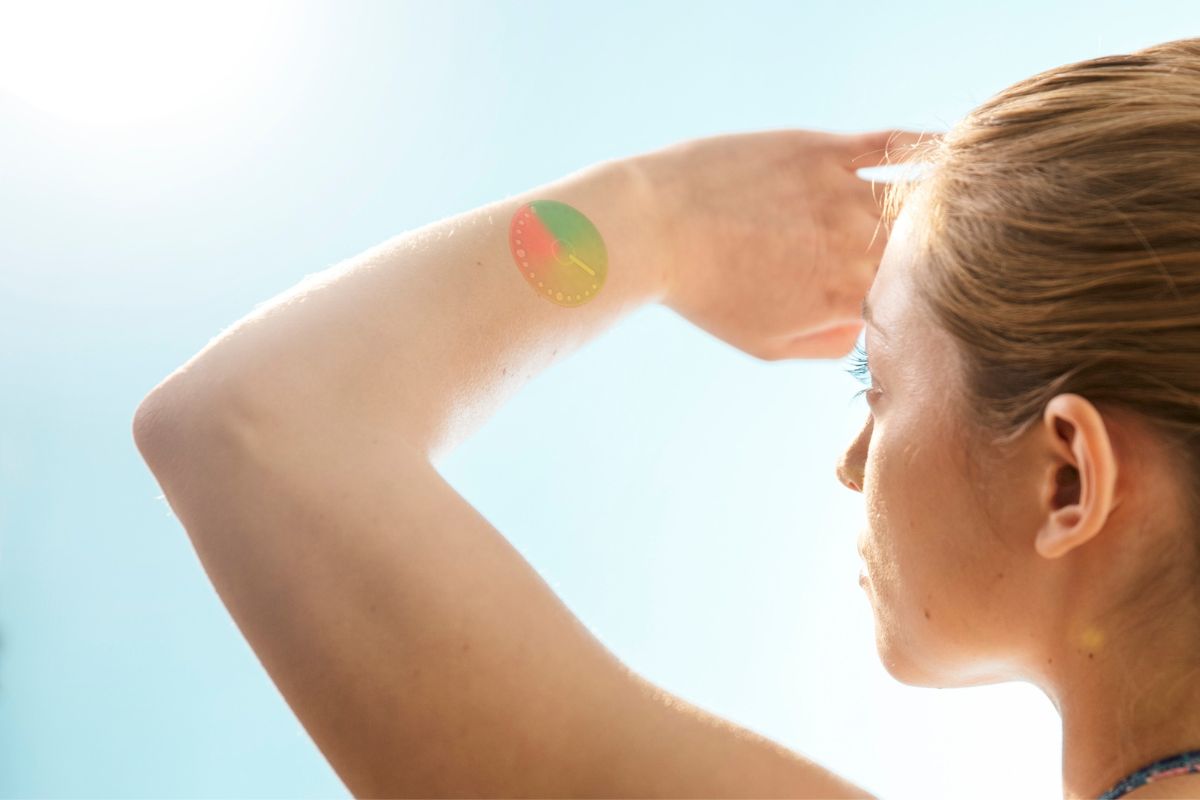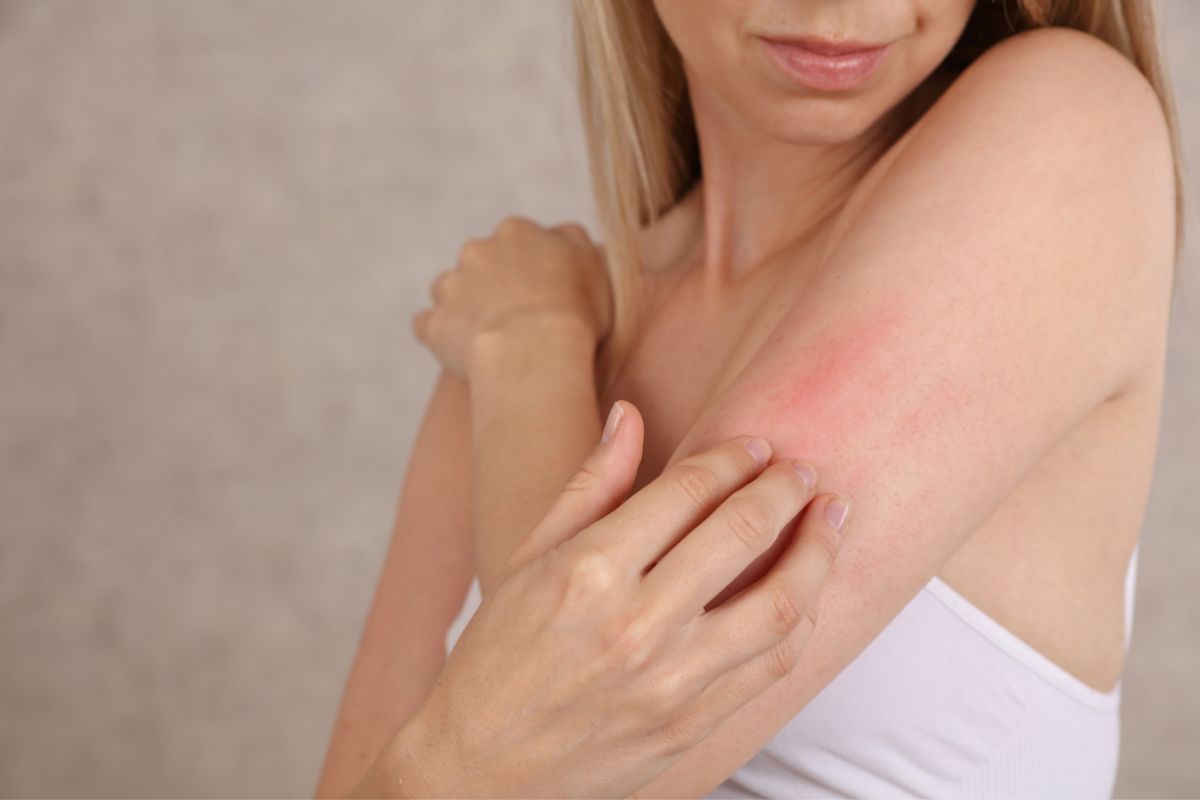If you have eczema you have likely heard many people giving you advice and recommendations on what you can do to help this skin condition.

A lot of this advice is not properly researched or proven and depending on who you ask the advice can even be conflicting.
A common recommendation made is that increased exposure to sun can help with eczema.
This recommendation in particular is interesting as a lot of people who even have a small understanding of skincare know that avoiding excessive sun exposure is generally not advised as UV can be damaging to your skin.
So having the conflicting advice of sun being good for eczema, but bad for your skin generally can lead to a lot of confusion.
It does not help that there is a lot of conflicting information about the results of sun exposure and eczema with seemingly an equal amount of people reporting that it helps as much as people saying that it harms.
There are even some people who have a rare type of eczema called ‘photosensitive eczema’ that can be worsened by sunlight.
This article will go over how sun exposure can affect eczema and what you should do when it comes to having eczema and spending time in the sun.
If the conflicting advice surrounding skincare and sun exposure is confusing you read on!
Can The Sun Help Eczema?
As previously mentioned, for those who have the rare type of ‘photosensitive’ eczema, then sunlight will definitely not help as it is likely one of the main causes and worsening factors of this type of eczema.
If this is the type of eczema you have, following a diagnosis a medical professional should be able to prescribe a proper treatment.
However, in other cases of eczema (see also ‘Why You Shouldn’t Ignore Your Eczema?‘), it has been shown that exposure to sunlight (in moderation) can help with clearing up eczema flare ups.
Even using phototherapy has been shown to help lessen the effects of some harmful eczema.
Sunlight has been shown to give a variety of other benefits with it giving you a boost in vitamin D and generally helping improve your mood.
If you are looking for a sunny day at the beach, this can also be beneficial to eczema with resting in salt water being proven to reduce stress and soothing skin with eczema.
However, once you have finished relaxing in the water you want to make sure you have rinsed off excess salt water, dried and applied moisturizer and sunscreen.
The best way to get the benefits of sunlight for eczema is to use it in moderation so you do not get any of the damaging effects of the UV.
Also, just being observant of what triggers changes in your eczema.
If you see that getting exposure to the sun helps your eczema, take advantage of this, and if you see it harms your skin, take necessary precautions.
Either way make sure to take all measures to protect your skin from extended exposure to sunlight.
Can Your Eczema Be Caused By Sunlight?

The answer to this question is very vague as there are many types of eczema and the cause of how they come about is not always known.
A lot of eczema can be due to genes, but there can be external factors that can cause or worsen this condition.
There have been studies that have actually proven the inverse with a 2015 study showing that a lack of exposure to sunlight and the following vitamin D deficiency can actually lead to eczema symptoms.
While this study has gained some traction, further proof and research is needed to make any conclusive statements.
As has been mentioned already there is the very rare ‘photosensitive’ eczema, but this is highly rare and if you have it, it is very likely that you have already been diagnosed.
In most cases it is unlikely that sunlight is the cause of having eczema, however, extended exposure to sunlight has been shown to be a cause of painful flare ups, so planning outdoors activities should come with precautions made to avoid this.
Protecting Skin With Eczema From Sunlight
As you can tell, extended exposure to sunlight can make eczema worse in a lot of cases and if you pick up a bad case of sunburn this can combine with eczema to make the condition even more painful.
This is because of how the skin is inflamed. If you become overheated you can also perspire more than needed that can also make eczema worse.
So what precautions can be made to protect skin with eczema from damage like sunburn?
- Keep cool when the weather is warm to avoid excess perspiration
- Make sure to have a source of shade when it is sunny
- Wear clothing that is not too tight and is breathable
- Keep protective items like hats and glasses handy
- Stay hydrated
- Use a sensitive sunscreen that works with your skin type and reapply when it is needed.
If you are already using skin care products for eczema make sure to consult your doctor to see if they will have any reaction to the heat or sunlight.
Will Sunscreen Make Eczema Worse?
As many people with eczema know, the condition makes your skin more sensitive and therefore products with sunscreen can cause worry as there is the possibility for a bad reaction with the eczema.
Most people with eczema find sunscreens that are mineral based preferable and generally avoid any fragrance.
Make sure to get the correct level of SPF for your skin type and look out for ingredients that you know you react to.
Before buying a product like this, always try and do a skin patch test so you can see how you react.
Conclusion
As you have seen in this article, skin with eczema reacts to sunlight, but unless you have a rare form of eczema, sunlight in moderation can help the condition, but make sure to take every possible precaution to protect yourself!
- Understanding Male Reproductive Health: A Complete Guide - February 2, 2025
- Simple Healthy Skin Habits for Radiant Skin - December 6, 2024
- Unlocking the Connection Between Nutrition and Mental Health - December 3, 2024








